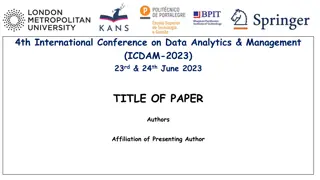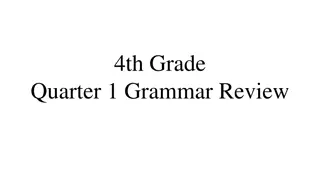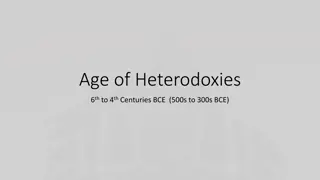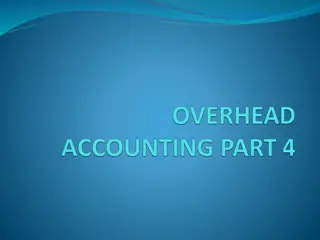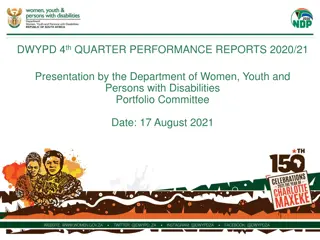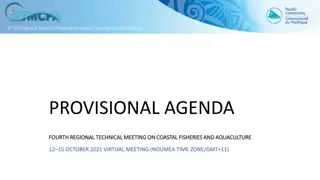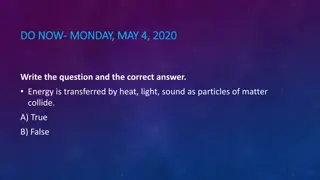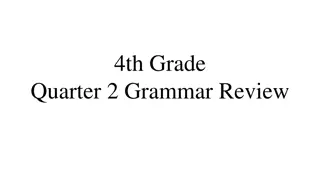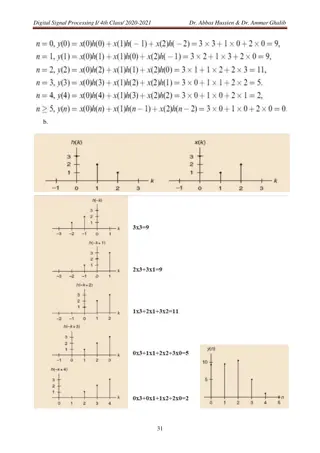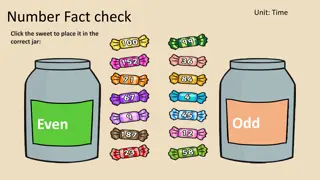
Nonparent Visitation Rights in Mississippi
Learn about nonparent visitation rights in Mississippi, including the conditions under which visitation can be sought, factors considered by the court, and qualifications for grandparents seeking visitation. Case examples such as Poole v. Poole illustrate how visitation rights can be awarded under Type 1 visitation. Discover who qualifies as grandparents and what constitutes a viable relationship for visitation.
Download Presentation

Please find below an Image/Link to download the presentation.
The content on the website is provided AS IS for your information and personal use only. It may not be sold, licensed, or shared on other websites without obtaining consent from the author. If you encounter any issues during the download, it is possible that the publisher has removed the file from their server.
You are allowed to download the files provided on this website for personal or commercial use, subject to the condition that they are used lawfully. All files are the property of their respective owners.
The content on the website is provided AS IS for your information and personal use only. It may not be sold, licensed, or shared on other websites without obtaining consent from the author.
E N D
Presentation Transcript
TYPE 1 VISITATION Whenever a court [awards] custody . . . to one of the parents of the child or terminates the parental rights of one of the parents . . . or one of the parents . . . dies, either parent of the child's parents who was not awarded custody or whose parental rights have been terminated or who has diedmay . . . seek visitation rights with the child. MISS. CODEANN. 93-16-3(1) (prior to amendment).
(1) potential disruption in the childs life; (2) suitability of the grandparents home; (3) the child s age; (4) the grandparents age and health; MARTIN V. COOP FACTORS (5) their emotional ties with the child; (6) the grandparents moral fitness; (7) distance from the parents home; (8) interference with parents discipline; (9) the grandparents employment; and (10) willingness not to interfere with the parents rearing of the child.
a court [awards] custody . . . to one of the parents of the child or terminates the parental rights of one of the parents . . . or one of the parents . . . dies, either parent of the child's parents who was not awarded custody or whose parental rights have been terminated or who has died may . . . seek visitation rights with the child. Whenever TYPE 1 AS AMENDED MISS. CODEANN. 93-16-3(1).
POOLE V. POOLE A grandmother who had been a child s guardian for four years was awarded visitation under Type 1 after the guardianship was terminated and her son took custody. The child s mother was deceased. The court held that a grandparent whose own child has custody and denies them visitation has standing under Type 1 as either parent of the child s parents.
PERSONS WHO QUALIFY AS GRANDPARENTS Great-grandparents are not entitled to visitation. Lott v. Alexander, 134 So. 3d 369, 374 (Miss. Ct. App. 2014). Visitation is limited to the parent of a child s parents. MISS. CODEANN. 93-16-3. Step-grandparents are not entitled to visitation. Garner v. Garner, 283 So. 3d 120, 141 (Miss. 2019).
VIABLE RELATIONSHIP To establish a viable relationship, a grandparent must show that they (1) supported the child financially in whole or in part for not less than six (6) months before filing, AND (2) Had frequent visitation including occasional overnight visitation with the child for not less than one (1) year, OR cared for the child for a significant period of time while the parent was in jail or on military duty.
ESTABLISHING A VIABLE RELATIONSHIP A chancellor erred in awarding a grandmother visitation with a ten- month-old with whom she did not have a viable relationship. The requirements must be met with respect to each child with whom the grandparent seeks visitation. Greer v. Akers, 364 So. 3d 662 (Miss. Ct. App. 2021) Thwarted attempts to establish a viable relationship with a child do not meet the statutory criteria. Grandparents whose gifts were returned and whose requests to visit were denied were not entitled to visitation. Aydelott v. Quartaro, 124 So. 3d 97 (Miss. Ct. App. 2013).
HUTSON V. HUTSON Parents reasonably denied a grandfather visitation with his biological granddaughter he refused their request to treat the girl s step-siblings equally. His disparate treatment of the children caused disharmony in their home. A court need not examine the Martin v. Coop factors unless it finds that there is a viable relationship AND that the parents unreasonably denied visitation.
Subsection (4) of the grandparent visitation statute applies only in Type 2 visitation. Battise v. Aucoin, 311 So. 3d 588, 590-92 (Miss. 2021). (4) Any petition for visitation rights under subsection (2) of this section shall be filed in the county where an order of custody as to the child has previously been entered. . . . . Upon a showing of financial hardship for the parents, the court shall . . . direct the grandparents to pay reasonable attorney's fees to the parent or parents . . . . without regard to the outcome of the petition. ATTORNEYS FEES
Prior to Brownlee, nonparent visitation appeared to be limited to - Grandparents (by statute) - Legal fathers who learned they were not biological fathers (based on acting in loco parentis) - Nonparents who agreed to be a coparent with a biological mother through IVF with anonymous donor sperm (under the equitable parenthood doctrine) VISITATION FOR OTHER NONPARENTS
NATURAL PARENT PRESUMPTION Traditional rule: In order to gain custody a nonparent must overcome the natural parent presumption by proving that the parent - Abandoned the child. - Deserted the child, or - Is unfit to have custody.
GRIFFITH V. PELL A legal father who learned during divorce that he was not his child s biological father was awarded custody. Because he acted in loco parentis to the child, he was treated equally with the mother in the custody analysis. The supreme court emphasized that the biological father did not seek a relationship with the child.
In loco parentis canin very limited, unique situations sometimes be used to help rebut the natural-parent presumption. (1) the husbands stood in loco parentis; (2) they had supported, cared for, and treated the child as their own; (3) they could have been required to pay child support; and (4) the biological fathers were not really in the picture. SMITH V. SMITH
SMITH V. SMITH Grandparents who stand in loco parentis have no right to the custody of a grandchild, as against a natural parent, unless the natural-parent presumption is first overcome by a showing of abandonment, desertion, detrimental immorality, or unfitness on the part of the natural parent. Thus, the Smiths' standing as in loco parentis is insufficient to overcome the natural-parent presumption.
A man who acted in loco parentis to his stepdaughter was entitled to be treated equally with the mother under the Albright custody analysis. The biological father was not seeking rights of custody or visitation. BALLARD V. BALLARD However, IF THE BIOLOGICAL FATHER IS IN THE PICTURE., a legal father who has acted in loco parentis is treated as any other third party and must overcome the natural parent presumption by proving abandonment, desertion, or unfitness.
BROWNLEE V. POWELL Pam argues that the doctrine of in loco parentis is not limited to [legal fathers who believed themselves to be biological fathers and to grandparents by statute.] We agree. We have never said it is applicable only in these two situations, but we have said it is only applicable in very limited, unique situations[.]
If Pam can prove that she falls within this Court s carved out exception of the very limited, unique situations below, her claim succeeds. The court then discusses the facts of Griffith v. Pell and J.P.M and the four-factor test for rebutting the natural parent presumption for custody. THE EXCEPTION The decision does not specifically say that the four-factor test applies to determine ILP visitation.
Although this doctrine grants third parties certain parental rights, such rights are inferior to those of a natural parent. UNEQUAL RIGHTS While there are very limited, unique situations in which in loco parentis can be used to help rebut the natural parent presumption, the fundamental rights of natural parents remain top tier.
BROAD READING OF BROWNLEE Under Brownlee - A nonparent who has acted in loco parentis to a child, - Forming a strong, significant relationship with the child, - May be awarded visitation in limited, unique circumstances, - When justice so requires and the child s wellbeing demands a relationship with a person who has stood in loco parentis in his or her life.
2008. Lilas mother dies. Lila and Lou live with Ellie and Sam for three years. 2011. Lou and Lila move into a home nearby. Sam and Ellie have regular visitation. 2013. Lou begins to date Katie, who becomes pregnant. March 2014. Katie gives birth to Andrew. Lou gets emergency custody. Sam and Ellie have visitation with Andrew . May 2014. Sam and Lou argue over whether Katie should be involved in Andrew s life. Lou will no longer allow them to see the children. SAM AND ELLIE V. LOU TIMELINE
POOLE V. POOLE A grandmother who had been a child s guardian for four years was awarded visitation under Type 1 after the guardianship was terminated and her son took custody. The child s mother was deceased. The court held that a grandparent whose own child has custody and denies them visitation has standing under Type 1 as either parent of the child s parents.
Applicable to the child: - potential disruption in the child s life - the child s age - distance from the parents home MARTIN V. COOP FACTORS Applicable to grandparents: - suitability of the grandparents home - the grandparents age and health - the grandparents moral fitness - the grandparents employment
Most significant in this case: - The grandparents emotional ties with the child - any interference with the parents discipline - willingness not to interfere with the parents rearing of the child. MARTIN V. COOP FACTORS
Whenever a court [awards] custody . . . to one of the parents of the child or terminates the parental rights of one of the parents . . . or one of the parents . . . dies, either parent of the child's parents may visitation rights with the child. TYPE 1 VISITATION . . . seek MISS. CODEANN. 93-16-3(1).
FACTOR 10: "The willingness of the grandparents to accept that the rearing of the child is the responsibility of the parent, and that the parent's manner of child rearing is not to be interfered with by the grandparents. MARTIN V. COOP
Type II requires Proof of a viable relationship (financial support for at least six months and significant visitation, including overnights) for one year AND TYPE II VISITATION The parents unreasonably denied visitation.
HUTSON V. HUTSON Parents reasonably denied a grandfather visitation with his biological granddaughter he refused their request to treat the girl s step-siblings equally. His disparate treatment of the children caused disharmony in their home. A court need not examine the Martin v. Coop factors unless it finds that there is a viable relationship AND that the parents unreasonably denied visitation.
BROAD READING OF BROWNLEE Under Brownlee - A nonparent who has acted in loco parentis to a child, - Forming a strong, significant relationship with the child, - May be awarded visitation in limited, unique circumstances, - When justice so requires and the child s wellbeing demands a relationship with a person who has stood in loco parentis in his or her life.
SUMMARY Brownlee v. Powell recognizes that nonparents other than legal, nonbiological fathers may have visitation rights. It is unclear whether the test is the four-factor test used to rebut the natural parent presumption for legal fathers or a broader unique situations test. If the four-factor test does apply, the requirements for the biological father s absence and the duty to pay child support will need refining.

